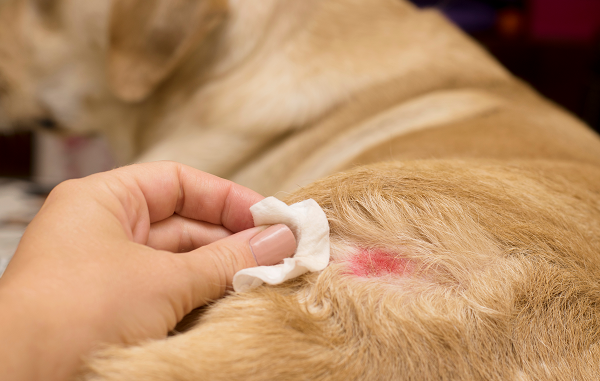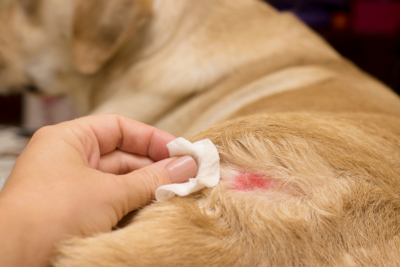
As a pet owner, ensuring the health and well-being of your furry friend is a top priority. When pets face injuries or skin conditions, it is not uncommon for them to require some form of treatment.
Ointments, which are commonly used in human medicine, can be a convenient and effective way to address minor cuts, abrasions, hot spots, dry skin, or rashes. However, pet owners often have concerns about the safety and efficacy of these ointments for animals.

In this article, we’ll explore whether ointments are safe for pets, what kinds are appropriate for different conditions, potential risks, and how to use them safely. We’ll also answer some frequently asked questions to help you make informed decisions about using ointments on your pet.
What is an Ointment?
An ointment is a type of topical treatment that is used to treat or soothe various skin conditions. It usually has a thicker consistency compared to creams or lotions and is typically formulated to create a protective barrier on the skin. Ointments can serve multiple purposes depending on their ingredients, such as providing moisture, healing wounds, or preventing infection.
Some common ingredients found in ointments include:
- Antibiotics (e.g., Neosporin)
- Steroids (e.g., hydrocortisone)
- Antifungals
- Antiseptics
- Emollients for moisturizing
- Pain-relieving agents
Ointments for pets may be specially formulated to address a range of skin issues that pets commonly experience, such as itching, rashes, dry skin, or injuries. However, it’s essential to recognize that not all ointments designed for humans are safe for pets, and certain active ingredients may be toxic to animals.
Are Ointments Safe for Pets?
The short answer is that it depends on the type of ointment, its ingredients, and the pet’s specific condition. While certain ointments are designed for veterinary use and are completely safe for pets, others—particularly human ointments—can be harmful. Some ointments intended for human use contain ingredients that are toxic to animals when ingested or absorbed through the skin.
Here’s what you need to consider before using any ointment on your pet:
1. The Ingredients Matter
The primary concern when using ointments on pets is the ingredients. Some ointments contain substances that may be safe for humans but dangerous for animals. For example:
Hydrocortisone: This is commonly found in over-the-counter ointments for itching and inflammation in humans. While low doses of hydrocortisone are sometimes used in veterinary treatments, high doses or prolonged use of steroid ointments can cause adverse effects in pets, such as skin thinning or adrenal suppression.
Neomycin (Neosporin): Neosporin is widely used to prevent infections in minor cuts and abrasions. However, it contains neomycin, an antibiotic that can be harmful to pets if ingested, causing gastrointestinal upset or even kidney damage. Dogs and cats may lick the ointment off their wounds, leading to the ingestion of harmful chemicals.
Zinc: Some ointments contain zinc, which is toxic to pets, particularly when ingested. Zinc poisoning can cause vomiting, diarrhea, lethargy, and other symptoms.
Benzocaine: A common numbing agent, benzocaine is safe for humans but can cause methemoglobinemia (a blood disorder) in pets, especially in cats.
2. Risk of Licking or Ingesting the Ointment
Pets, especially dogs and cats, tend to lick their wounds, and it is crucial to consider whether the ointment may be ingested. If the ointment is toxic, ingestion can lead to serious health issues. For instance, if a pet licks off an ointment containing harmful chemicals or medications, it could experience vomiting, diarrhea, or an allergic reaction.
In these situations, a cone (also known as an Elizabethan collar) might be necessary to prevent licking, especially if the ointment has been applied to an area that the pet can easily reach.
3. Potential for Allergic Reactions
Even ointments that are safe for pets can cause allergic reactions in some animals. Signs of an allergic reaction to an ointment may include redness, swelling, irritation, or increased itching at the site of application. If these symptoms occur, it is important to remove the ointment and consult a veterinarian as soon as possible.
4. Specific Conditions Requiring Veterinary-Approved Ointments
Certain conditions in pets require specialized ointments that are formulated for animal use. For example, pets with ear infections, hot spots, fungal infections, or severe wounds should receive a veterinary-approved treatment rather than a generic human ointment.
Some ointments are specifically designed to address common issues in pets, such as:
- Hot spots: Painful, infected skin lesions that can result from itching or scratching.
- Fungal infections: Ringworm and other fungal infections are common in pets, and specific antifungal ointments may be prescribed.
- Skin allergies: Ointments with steroids or antihistamines may help to reduce inflammation and itching caused by allergies.
Veterinary ointments are often formulated to be safe for pets and are designed to address their specific needs. These treatments typically have lower toxicity risks and are more appropriate for your pet’s unique skin conditions.
Benefits of Using Ointments on Pets
When used correctly and with the right ingredients, ointments can offer several benefits for pets:
1. Promotes Wound Healing
Ointments help to keep the affected area moisturized and protected, creating an optimal environment for the skin to heal. Ointments can be especially helpful for minor cuts, scrapes, or abrasions that your pet might experience during outdoor activities or play.
2. Reduces Inflammation and Itching
Certain ointments, such as those containing hydrocortisone or aloe, can help reduce inflammation and itching caused by skin allergies, insect bites, or other irritants. By soothing the skin, ointments can make your pet more comfortable during the healing process.
3. Prevents Infection
Ointments that contain antiseptics or antibiotics can help prevent infections in open wounds. Keeping a wound clean and free from bacteria is essential to promoting healing and avoiding complications.
4. Relieves Pain
Some ointments are formulated with pain-relieving agents, such as lidocaine, which can provide relief for pets experiencing discomfort due to minor injuries or skin conditions. These ointments help alleviate pain and can improve your pet’s quality of life.
READ ALSO: How Meloxicam Can Help Ease Your Pet’s Discomfort
How to Use Ointments Safely on Your Pet
If you’ve consulted your veterinarian and have been advised to use an ointment on your pet, it’s important to follow proper guidelines for safe use:
1. Choose the Right Ointment: Always use ointments specifically formulated for pets or those recommended by your veterinarian. Avoid using human ointments unless directed by a vet.
2. Clean the Affected Area: Before applying the ointment, clean the affected area gently with water or a mild antiseptic solution. Pat it dry with a clean towel to remove any dirt, debris, or excess moisture.
3. Apply the Ointment: Squeeze a small amount of ointment onto the affected area and gently rub it in. Be sure to follow your veterinarian’s instructions regarding the amount and frequency of application.
4. Prevent Licking: If necessary, use an Elizabethan collar (cone) to prevent your pet from licking the ointment off. Licking can not only reduce the ointment’s effectiveness but can also lead to ingestion of potentially harmful ingredients.
5. Monitor Your Pet: After applying the ointment, monitor your pet for any signs of irritation or allergic reactions. If you notice swelling, redness, or increased discomfort, contact your vet immediately.
6. Follow Up: For conditions that require ongoing treatment, make sure to follow up with your veterinarian as needed. Some skin conditions may require multiple applications or a change in treatment.
FAQs
Can I use human ointments like Neosporin on my dog?
While Neosporin is effective for human use, it is not recommended for dogs unless directed by your veterinarian.
The ingredients, especially neomycin, can be harmful if ingested, and pets may lick it off and ingest the medication. Always consult with your vet before using human products on your pet.
What should I do if my dog licks off the ointment?
If your dog licks off the ointment, monitor them closely for any signs of gastrointestinal upset, such as vomiting or diarrhea. If you’re concerned about the ointment being ingested or if your pet exhibits symptoms, contact your vet immediately.
How can I tell if an ointment is safe for my pet?
To ensure an ointment is safe for your pet, check if it is specifically designed for animals and recommended by a veterinarian. Avoid using human ointments unless instructed to do so by your vet. Always read the label for ingredients that may be toxic to pets, such as zinc, benzocaine, or certain antibiotics.
Can I use ointments on my pet’s hot spots or skin infections?
Yes, ointments designed for pets with hot spots, skin infections, or other dermatological issues can be very effective. However, it is crucial to choose the correct product based on the underlying issue. Your veterinarian can recommend the appropriate ointment for your pet’s specific condition.
How do I prevent my pet from licking the ointment?
Using an Elizabethan collar (cone) is the most common way to prevent pets from licking ointments. It can also help prevent your pet from causing further irritation or injury to the affected area.
Leave a Reply